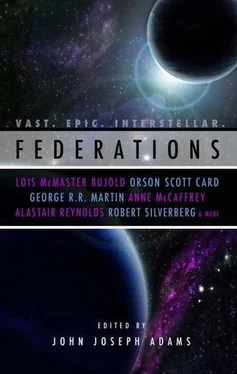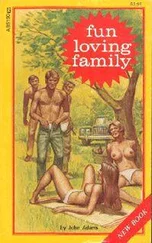“Makes me want to… I don’t know.” I forced my gaze away from the Royalists. “Puke or something. It’s like going back to having hair all over your body.”
“That’s because you grew up with something different.”
“Did they always have two sexes?”
“Probably not. What I do know is that the wasps bred from the survivors, but something wasn’t right. Apart from the reversion to dimorphism, the children didn’t grow up normally. Some part of their brains hadn’t developed right.”
“Meaning what?”
“They’re morons. The wasps keep trying to fix things of course. That’s why the Splinterqueen will do everything to help Yarrow—and us, of course. If she can study or even capture our thought patterns—and the demons make that possible—maybe she can use them to imprint consciousness back onto the Royalists. Like the Florentine architecture I said they copied, right? That was one template, and Yarrow’s mind will be another.”
“That’s supposed to cheer me up?”
“Look on the bright side. A while from now, there might be a whole generation of people who think along lines laid down by Yarrow.”
“Scary thought.” Then wondered why I was able to crack a joke, with destruction looming so close in the future. “Listen, I still don’t get it. What makes them want to bring life to the Swirl?”
“It seems to boil down to two… imperatives , I suppose you’d call them. The first’s simple enough. When wasps were first opening up Greater Earth’s solar system, back in the mid-twenty-first century, we sought the best way for them to function in large numbers without supervision. We studied insect colonies and imprinted the most useful rules straight into the wasps’ programming. More than six hundred years later, those rules have percolated to the top. Now the wasps aren’t content merely to organize themselves along patterns derived from living prototypes. Now they want to become—or at least give rise to—living forms of their own.”
“Life envy.”
“Or something very like it.”
I thought about what Wendigo had told me, then said: “What about the second imperative?”
“Trickier. Much trickier.” She looked at me hard, as if debating whether to broach whatever subject was on her mind. “Spirey, what do you know about Solar War Three?”
• • •
The wasps had given up on Yarrow while we traveled. They had left her on a corniced plinth in the middle of the terrazzo, poised on her back, arms folded across her chest, tail and fluke draping asymmetrically over one side.
“She didn’t necessarily fail, Spirey,” Wendigo said, taking my arm in her own unyielding grip. “That’s only Yarrow’s body, after all.”
“The Queen managed to read her mind?”
There was no opportunity to answer. The chamber shook, more harshly than when Mouser had exploded. The vibration keeled us to the floor, Wendigo’s metal arms cracking against the tessellated marble. As if turning in her sleep, Yarrow slipped from the plinth.
“Home,” Wendigo said, raising herself from the floor.
“Impossible. Can’t have been more than two hours since Mouser was hit. There shouldn’t be any response for another four!”
“They probably decided to attack us regardless of the outcome of their last attempt. Kinetics.”
“You sure there’s no defense?”
“Only good luck.” The ground lashed at us again, but Wendigo stayed standing. The roar that followed the first impact was subsiding, fading into a constant but bearable complaint of tortured ice. “The first probably only chipped us—maybe gouged a big crater, but I doubt that it ruptured any of the pressurized areas. Next time could be worse.”
And there would be a next time, no doubt about it. Kinetics were the only weapon capable of hitting us at such long range, and they did so by sheer force of numbers. Each kinetic was a speck of iron, accelerated to a hair’s breadth below the speed of light. Relativity bequeathed the speck a disproportionate amount of kinetic energy—enough that only a few impacts would rip the splinter to shreds. Of course, only one in a thousand of the kinetics they fired at us would hit—but that didn’t matter. They’d just fire ten thousand.
“Wendigo,’’ I said. “Can we get to your ship?”
“No,” she said, after a moment’s hesitation. “We can reach it, but it isn’t fixed yet.”
“Doesn’t matter. We’ll lift on auxiliaries. Once we’re clear of the splinter we’ll be safe.”
“No good, either. Hull’s breached—it’ll be at least an hour before even part of it can be pressurized.”
“And it’ll take us an hour or so just to get there, won’t it? So why are we waiting?”
“Sorry, Spirey, but—”
Her words were drowned by the arrival of the second kinetic. This one seemed to hit harder, the impact trailing away into aftergroans. The holographic frescos were all dark now. Then—ever so slowly—the ceiling ruptured, a huge mandible of ice probing into the chamber. We’d lost the false gravity; now all that remained was the splinter’s feeble pull, dragging us obliquely toward one wall.
“ But what?” I shouted in Wendigo’s direction.
For a moment she had that absent look, which said she was more Queen than Wendigo. Then she nodded in reluctant acceptance. “All right, Spirey. We play it your way. Not because I think our chances are great. Just that I’d rather be doing something.”
“Amen to that.”
It was uncomfortably dim now, much of the illumination having come from the endlessly cycling frescos. But it wasn’t silent. Though the groan of the chamber’s off-kilter spin was gone now, what remained was almost as bad: the agonized shearing of the ice that lay beyond us. Helped by wasps, we made it to the train. I carried Yarrow’s corpse, but at the door Wendigo said: “Leave her.”
“No way.”
“She’s dead, Spirey. Everything of her that mattered, the Splinterqueen already saved. You have to accept that. It was enough that you brought her here, don’t you understand? Carrying her now would only lessen your chances—and that would really have pissed her off.”
Some alien part of me allowed the wasps to take the corpse. Then we were inside, helmeted up and breathing thick.
As the train picked up speed, I glanced out the window, intent on seeing the Queen one last time. It should have been too dark, but the chamber looked bright. For a moment I presumed the frescos had come to life again, but then something about the scene’s unreal intensity told me the Queen was weaving this image in my head. She hovered above the debris-strewn terrazzo—except that this was more than the Queen I had seen before. This was—what?
How she saw herself?
Ten of her twelve wasp composites were now back together, arranged in constantly shifting formation. They now seemed more living than machine, with diaphanous sunwings, chitin-black bodies, fur-sheened limbs and sensors, and eyes that were faceted crystalline globes, sparkling in the chamber’s false light. That wasn’t all. Before, I’d sensed the Queen as something implied by her composites. Now I didn’t need to imagine her. Like a ghost in which the composites hung, she loomed vast in the chamber, multiwinged and brooding—
And then we were gone.
We sped toward the surface for the next few minutes, waiting for the impact of the next kinetic. When it hit, the train’s cushioned ride smothered the concussion. For a moment I thought we’d made it, then the machine began to decelerate slowly to a dead halt. Wendigo convened with the Queen, and told me the line was blocked. We disembarked into vacuum.
Ahead, the tunnel ended in a wall of jumbled ice.
Читать дальше












